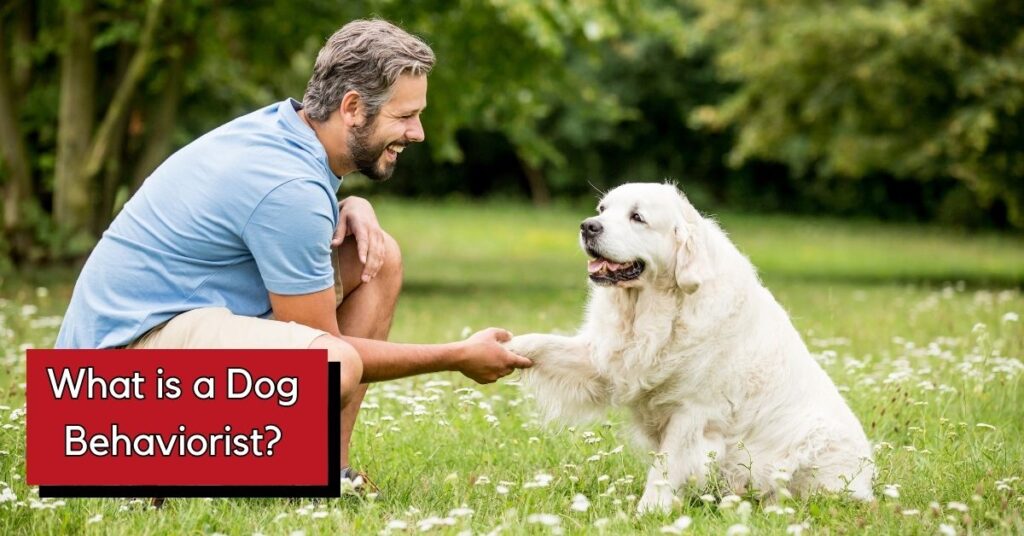Like humans, our beloved canine companions can sometimes face behavioral issues that can be challenging to address. This is where a professional dog behaviorist comes into play. In this blog post, we will delve into the world of dog behaviorists, explaining their role and shedding light on the reasons why hiring one can be a transformative experience for both you and your furry friend.

Table of Contents
What is a Dog Behaviorist?
A dog behaviorist is a highly trained professional who specializes in understanding and modifying the behavior of dogs. These experts have a deep understanding of canine psychology and use their knowledge to analyze and address problematic behaviors in dogs. A behaviorist approaches each dog as an individual, taking into consideration their unique personality, breed traits, and environmental factors that may contribute to their behavior.
Qualifications and Expertise:
Dog behaviorists typically acquire their expertise through extensive education and practical experience. Many behaviorists hold advanced degrees in animal behavior or psychology, and some have certifications from reputable organizations. They constantly update their knowledge by attending workshops, conferences, and seminars to stay on top of the latest research and techniques in dog behavior modification.

The Role of a Dog Behaviorist:
These professionals actually have a few roles. Let’s take a closer look at each one.
Identifying the Underlying Causes:
One of the main responsibilities of a dog behaviorist is to identify the root causes of a dog’s behavioral issues. They use their expertise and experience to analyze a pup’s issues, looking for triggers, patterns, and potential contributing factors.
By understanding the underlying causes, a behaviorist can develop an effective behavior modification plan tailored to the specific needs of the dog.
Behavior Modification Techniques:
Once the underlying causes have been identified, the behaviorist implements modification techniques to address the problematic behaviors. These techniques may involve positive reinforcement, desensitization, counter-conditioning, or other proven methods.
The behaviorist will work closely with both the dog and the owner, teaching them how to implement these techniques consistently and effectively.
Training the Owner:
A dog behaviorist not only works with the dog but also plays a crucial role in training the owner. They educate the owner about dog behavior, body language, and communication, enabling them to better understand their pet’s needs.
This helps owners reinforce positive behaviors, recognize potential triggers, and respond appropriately to their dog’s actions. By educating owners, behaviorists create a solid foundation for long-term behavioral improvement and a stronger bond between the dog and its owner.

What is the difference between an animal behaviorist and a regular dog trainer?
While both dog behaviorists and regular trainers work with dogs, there are some key differences in their approaches and areas of expertise. Understanding these differences can help you determine which professional is best suited to address your specific needs.
Focus:
As the name implies, dog behaviorists primarily specialize in the behavior of dogs, with a strong emphasis on understanding the underlying causes of problematic behaviors. They have a deep knowledge of canine psychology, allowing them to address complex issues that may stem from various factors such as fear, anxiety, or aggression.
Regular trainers, on the other hand, focus more on obedience training, teaching dogs basic commands, and improving their manners. Trainers may work with dogs of all ages and behaviors, from puppies learning basic commands to adult dogs needing leash manners or specific training for activities like agility or scent work.
Education and Credentials:
Typically speaking, dog behaviorists have higher levels of education and specialized training in animal behavior. Many hold advanced degrees in fields such as animal behavior, psychology, or ethology.
Regular trainers may have completed certification programs or apprenticeships, but their training and credentials may vary widely. Some trainers have extensive experience and knowledge in dog behavior, while others may focus more on specific training methods or specialties.
That said, unfortunately, there are no “rules” about who gets to call themselves a dog behaviorist. Don’t assume that someone who claims to be one has any sort of actual training or education to back up that claim. Do your homework and ask for certifications. Then make sure those certification programs have education requirements. The American College of Veterinary Behaviorists (ACVB) is a good one.
Problematic Behaviors vs. Basic Training:
Behaviorists conduct in-depth assessments to identify the root causes of these behaviors and develop customized behavior modification plans to address them effectively.
Regular trainers, on the other hand, specialize in teaching basic obedience commands, socialization, leash manners, and other foundational training skills.
Approach and Techniques:
Dog behaviorists typically utilize a more comprehensive approach to behavior modification. They assess the dog’s behavior holistically, taking into account their history, genetics, environment, and underlying emotions.
Behaviorists then often use positive reinforcement techniques, desensitization, counter-conditioning, and other evidence-based methods to modify behavior and address underlying emotional issues.
Regular trainers typically use positive reinforcement techniques as well (if yours doesn’t, consider switching to someone else), focusing on rewarding desired behaviors and using consistent cues and commands. They may also use specific tools or methods tailored to the training goals, such as clicker training or marker training.
Amount of time spent on training:
Working with an animal behaviorist often involves a more long-term commitment due to the complexity of behavioral issues. Modifying those behaviors requires patience, consistency, and ongoing support. Behaviorists may schedule multiple sessions over several weeks or months to monitor progress, adjust strategies, and ensure the successful modification of problematic behaviors.
Regular trainers usually work with clients for shorter durations, focusing on achieving specific goals within a given timeframe. They may offer classes, private sessions, or follow-up sessions as needed to reinforce training and address any concerns.
Ultimately, whether you choose to work with a dog behaviorist or a regular trainer depends on your specific needs and the behavioral challenges your dog is facing. For severe behavior problems or complex issues, consulting a dog behaviorist is recommended, while regular trainers are suitable for obedience training, basic manners, and specific training goals.
In some cases, a collaboration between a behaviorist and a trainer may be beneficial for a holistic approach to your dog’s well-being.
When & Why Would You Need to Hire a Dog Behaviorist?
Now that we understand what a dog behaviorist is and how they differ from regular trainers, let’s go over some of the reasons why you’d want to hire one.
Addressing Complex Behavioral Issues:
Some dog issues can be super complex and deeply rooted, requiring a great deal of specialized knowledge and experience to address them effectively. Most of us- even those of us who have had dogs all of our lives- don’t really have that sort of expertise. Hiring a behaviorist ensures that your dog receives professional help tailored to their specific needs.
Individualized Approach:
Each dog is unique. There is no one-size-fits-all guide to training problematic behaviors out of a dog. A behaviorist recognizes this fact and takes an individualized approach to behavioral modification.
Preventing Future Issues:
Working with a dog behaviorist is not just about addressing current behavioral problems but also about preventing future issues. Behaviorists equip owners with the knowledge and skills necessary to recognize and manage potential triggers and problematic behaviors before they escalate. This proactive approach can significantly contribute to the long-term well-being and happiness of both the dog and the owner.
Expert Guidance and Support:
Trying to tackle behavioral issues on your own can be overwhelming and frustrating. Hiring a dog behaviorist provides you with the guidance and support of an expert who has dedicated their career to understanding canine behavior. They will be there to answer your questions, provide reassurance, and offer practical advice throughout the behavior modification process.
Saving Time and Energy:
Behavioral issues can consume a significant amount of your time and energy, especially if you are unsure about the most effective approaches to use. By enlisting the help of a dog behaviorist, you can save time by receiving expert guidance from the start.
Behaviorists have experience working with a wide range of behavioral issues and can efficiently devise an appropriate plan of action. This allows you to focus on enjoying the companionship of your dog rather than constantly dealing with problematic behaviors.
Positive Impact on Overall Well-being:
Behavioral issues not only affect your dog’s behavior but can also have a significant impact on their overall well-being. Unaddressed behavioral problems can lead to stress, anxiety, and even physical health issues in dogs.
By hiring a behaviorist, you are investing in your dog’s mental and emotional well-being, ensuring they live a happier and healthier life.
Conclusion:
If you find yourself struggling with your dog’s behavioral issues, hiring a professional dog behaviorist can be a game-changer. These experts possess the knowledge, experience, and skills necessary to identify the underlying causes of your dog’s behavior and implement effective behavior modification techniques.
Through their guidance, you can address complex behavioral issues, prevent future problems, and strengthen the bond between you and your furry friend. By enlisting the support of a dog behaviorist, you’re taking a proactive step towards improving your dog’s well-being and enjoying a harmonious relationship filled with joy, understanding, and companionship.

